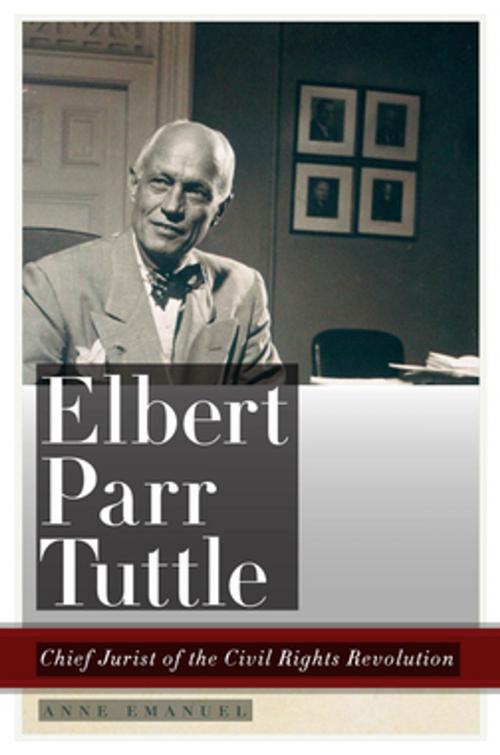Elbert Parr Tuttle
Chief Jurist of the Civil Rights Revolution
Nonfiction, Reference & Language, Law, Legal History, Social & Cultural Studies, Political Science, Politics, Civil Rights, Biography & Memoir, Reference| Author: | Anne Emanuel, Paul Finkelman, Timothy Huebner | ISBN: | 9780820341798 |
| Publisher: | University of Georgia Press | Publication: | October 1, 2011 |
| Imprint: | University of Georgia Press | Language: | English |
| Author: | Anne Emanuel, Paul Finkelman, Timothy Huebner |
| ISBN: | 9780820341798 |
| Publisher: | University of Georgia Press |
| Publication: | October 1, 2011 |
| Imprint: | University of Georgia Press |
| Language: | English |
This is the first—and the only authorized—biography of Elbert Parr Tuttle (1897–1996), the judge who led the federal court with jurisdiction over most of the Deep South through the most tumultuous years of the civil rights revolution. By the time Tuttle became chief judge of the United States Court of Appeals for the Fifth Circuit, he had already led an exceptional life. He had cofounded a prestigious law firm, earned a Purple Heart in the battle for Okinawa in World War II, and led Republican Party efforts in the early 1950s to establish a viable presence in the South. But it was the intersection of Tuttle’s judicial career with the civil rights movement that thrust him onto history’s stage.
When Tuttle assumed the mantle of chief judge in 1960, six years had passed since Brown v. Board of Education had been decided but little had changed for black southerners. In landmark cases relating to voter registration, school desegregation, access to public transportation, and other basic civil liberties, Tuttle’s determination to render justice and his swift, decisive rulings neutralized the delaying tactics of diehard segregationists—including voter registrars, school board members, and governors—who were determined to preserve Jim Crow laws throughout the South.
Author Anne Emanuel maintains that without the support of the federal courts of the Fifth Circuit, the promise of Brown might have gone unrealized. Moreover, without the leadership of Elbert Tuttle and the moral authority he commanded, the courts of the Fifth Circuit might not have met the challenge.
This is the first—and the only authorized—biography of Elbert Parr Tuttle (1897–1996), the judge who led the federal court with jurisdiction over most of the Deep South through the most tumultuous years of the civil rights revolution. By the time Tuttle became chief judge of the United States Court of Appeals for the Fifth Circuit, he had already led an exceptional life. He had cofounded a prestigious law firm, earned a Purple Heart in the battle for Okinawa in World War II, and led Republican Party efforts in the early 1950s to establish a viable presence in the South. But it was the intersection of Tuttle’s judicial career with the civil rights movement that thrust him onto history’s stage.
When Tuttle assumed the mantle of chief judge in 1960, six years had passed since Brown v. Board of Education had been decided but little had changed for black southerners. In landmark cases relating to voter registration, school desegregation, access to public transportation, and other basic civil liberties, Tuttle’s determination to render justice and his swift, decisive rulings neutralized the delaying tactics of diehard segregationists—including voter registrars, school board members, and governors—who were determined to preserve Jim Crow laws throughout the South.
Author Anne Emanuel maintains that without the support of the federal courts of the Fifth Circuit, the promise of Brown might have gone unrealized. Moreover, without the leadership of Elbert Tuttle and the moral authority he commanded, the courts of the Fifth Circuit might not have met the challenge.















